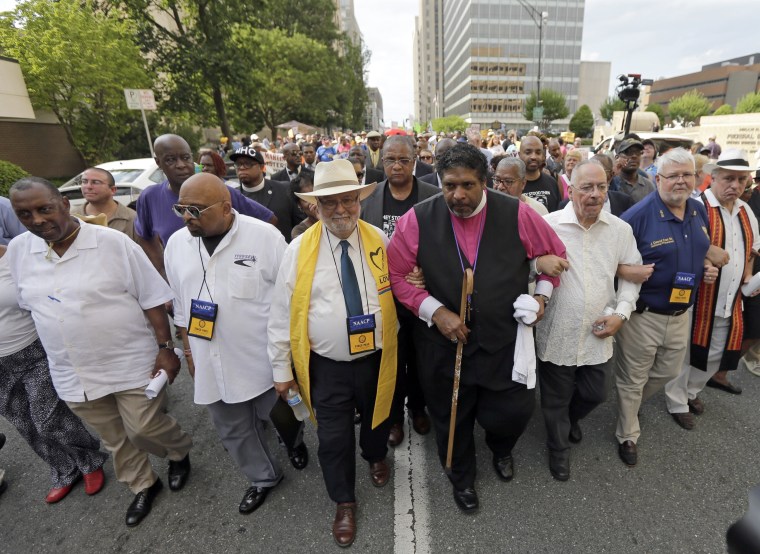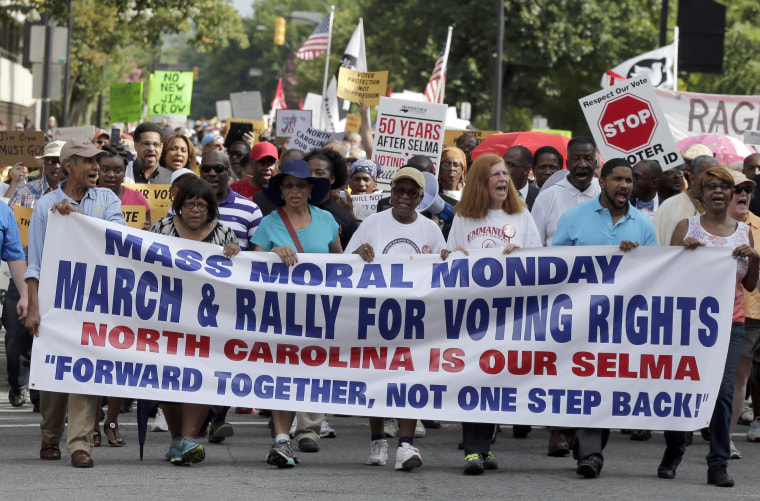To join a crowd of thousands in defense of the right to vote – is something I expected my parents to be a part of. Not me. Not in 2015. Not after Bloody Sunday and the passage of the Voting Rights Act 50 years ago.
Yet last Monday, I stood before a crowd of thousands who came from across the U.S., to join in the Moral Mondays March for Voters’ Rights in Winston-Salem, NC. I looked around at the amazing sea of humanity and realized that each person is a bridge.
A bridge from the past in which Jimmie Lee Jackson, James Chaney, Andrew Goodman, Michael Schwerner, Viola Liuzzo, James Reeb and our fore-parents laid down their lives so we would have the right to vote.
A bridge to the future, to a time when every vote will count, where Black Lives will Matter and where every life is precious.
I am a bridge. A bridge from Mississippi where my Great Uncle George registered voters in the countryside and my mom sang in the gospel choir with Fannie Lou Hamer.
A bridge to New York City, where my multi-racial gospel choir and congregation worship in hoodies, pray with our hands up; chant “When he can’t breathe, we can’t breathe;” and die-in on street corners, in City Hall, and on Capitol Hill, because we know the urgent nature of anti-racist work in these days and times.
We are building a bridge that is intersectional. Because we know that when voters rights happen, civil rights happen. Because the right to vote is our voice and power to change our circumstances.
We are a bridge between Selma and Salem. These words come from the same Semitic root, SLM. Selma means peace in Arabic, and Salem means peace in Hebrew. Salaam. Shalom. We are building a bridge for peace that is multi-faith, interreligious and multiracial.
One in which Linda Sarsour, a Palestinian Muslim-American, stands for Voters Rights and Black Lives Matter. Sister Simone Campbell, the Nun on the Bus, stands for Voters Rights and Black Lives Matter. Retired Episcopal Bishop Gene Robinson, the first openly gay man to be elected to the high Christian Church, stands for Voters Rights and Black Lives Matter. Rabbis Sharon Brous and Stephanie Kolin stand for Voters Rights and Black Lives Matter. An African-American Chicago pastor, Rev. Dr. Otis Moss III, and a white Mississippi pastor, Rev. Dr. Peter Heltzel, stand together for Voters’ Rights and Black Lives Matter.
We are building a bridge that is intersectional.

Because we know that when voters rights happen, civil rights happen. Because the right to vote is our voice and power to change our circumstances. To make sure our children grow and learn in safe places and our elders have health care in their twilight years. To make sure a college education is affordable and jobs are available. That our air and water are clean, and that everyone has enough.
It’s a bridge to change, to hope, to the glory of the coming of justice; a bridge that will only be built if we all pick up the hammer and get to building.
For this is our bridge; and this is our Selma.
The Rev. Dr. Jacqui Lewis is an Auburn Senior Fellow and Senior Minister at Middle Collegiate Church in Manhattan. Middle Church is a multiracial, multicultural, fully inclusive congregation where everyone is welcome just as they are as they come through the door. Middle Church works for racial, economic and LGBTQ/Gender justice and will not rest until freedom comes.
